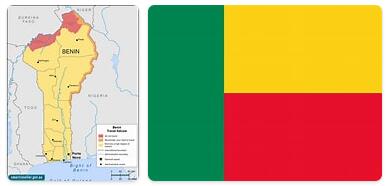The possibility of traveling in and out of the country is very limited or impossible. For more information about coronavirus and entry/exit, see Health.
Safety
The crime that affects tourists is usually money-motivated, in the form of theft and armed robbery, but it is mostly safe to travel in the country. Events happen both daytime and evening. Travelers are encouraged to take reasonable precautions and to show particular care in choosing a place of residence and location. Luggage should be kept under close supervision at airports, bus stations etc.
Benin is not particularly prone to natural disasters, but during the rainy season (May – October) the amount of rainfall can be so strong that floods occur, especially in northern Benin.
Elsewhere in the country, there can be so heavy rainfall that roads are flooded and air traffic is hampered.

Entry
Please note that entry regulations may change. The Foreign Service is not responsible if the following information on entry regulations or visa requirements is changed at short notice. It is the responsibility of the traveler to ensure that travel documents are valid for entry and to familiarize themselves with the current entry rules for each country.
Norwegians must have a visa to Benin, but this is easily applied for online and a visa is received upon arrival at the airport in Cotonou. It cannot be expected that visas can be obtained at the border crossing. Otherwise, a visa can be applied for, for example. Benin’s embassy in Denmark. This should be done well in advance of departure. Access to longer work stays in Benin must be checked with the employer or the client.
Health
Coronavirus (covid-19): The virus has been detected in Benin . The health services in the country are generally weak and have poor capacity, even in the big cities.
As of March 23, the possibility of traveling in and out of Benin is very limited. In a few days it will probably be almost impossible to travel in and out of the country. The possibility of health care is very limited or non-existent. The ability of the Embassy (Nigeria) to provide consular assistance is very limited.
Follow local authorities’ advice, guidance and instructions on how to deal with the situation, including restrictions on entry and exit and rules on arrival from abroad. Relevant information can be found on the Benin authorities’ websites.
Authorities also provide information through local media and it may be necessary to contact the airline in advance of departure.
You can find more information and guidance from the Norwegian health authorities on the website of the Norwegian Institute of Public Health. See also UD’s answers to frequently asked questions about travel and coronavirus.
***
Normally, yellow fever vaccine is required for entry. Other travel vaccines are recommended and should be checked by a doctor. Prevention tablets for malaria are recommended. For more on current travel vaccines, check the website of the Norwegian Institute of Public Health.
It is recommended to boil and filter water and wash fruits and vegetables in chlorine solution or similar. HIV virus is widespread. There are private clinics of acceptable standard for treating the most common diseases in the big cities. Hospitals abroad are recommended for more serious cases. Therefore, it is important to have good travel insurance. There are restaurants of acceptable standard in the larger cities.
Practical information
There is generally no need to pay special attention to local customs and clothing, beyond normal respectful behavior. It is recommended that visiting women in Muslim areas in the north dress in half-length or long skirts or trousers. It should be taken into account during religious holidays. According to allcitycodes, Benin area code is +229.
There are severe penalties for crime and drug possession.
Common administrative and national languages are French, which is mastered by most. However, the local varieties of French can be difficult to understand for a first-time visitor. There are also a large number of other languages in Benin. The local main languages are fon, yoruba, dendi, bariba and gen.
There is 220 volt AC power. Voltage varies greatly and power outages occur frequently. There is mobile coverage in most of the country, at least in urban areas and along the busiest roads. However, the mobile network is overloaded, and it is often difficult to arrive.
Banks and public offices normally open at. 8 or 7 p.m. 9 and usually closes between 9 p.m. 3 pm and 3 pm 17. Shops are often open until late at night and Saturdays.
Benin mainly has a cash-based economy, and the use of credit cards is generally only possible at the major hotels in Porto Novo and Cotonou. However, the use of credit cards is not recommended due to. the danger of fraud.
Norway and Benin are in the same time zone (GMT +1), but when it is summer time in Norway there is an hour time difference (Norway an hour ahead).
Climate; dry season November – March and rainy season April – October.
Public transport is not recommended. Car hire with driver is possible and should be booked in advance via reliable contacts.